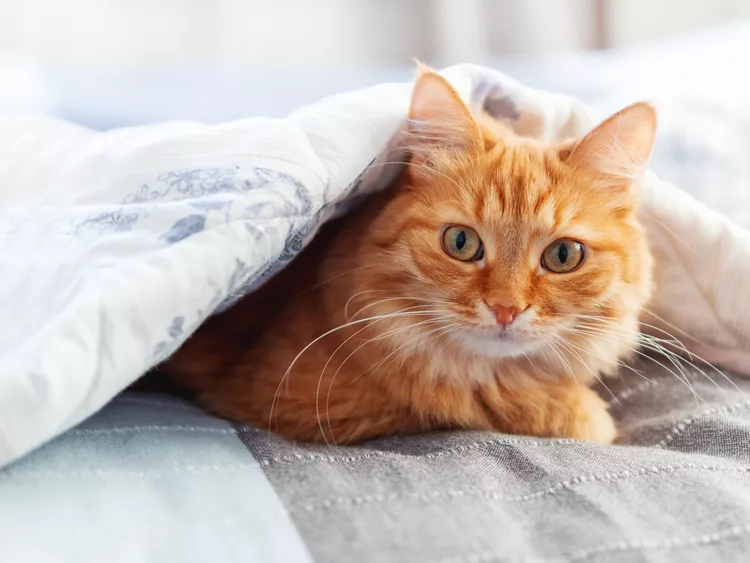Why Cats Stare at You While You Sleep and How to Stop It

If you’ve ever been rudely woken up from a deep and serene sleep thanks to a heavy cat sitting on your chest and wafting cat breath into your face, you’re not alone. Staring at humans while they sleep is a common cat behavior, albeit a puzzling (and sometimes annoying) one.
As it turns out, cats stare at people a lot, not just while they’re sleeping. Cats often stare at you while you’re awake for the same reasons they stare at you while you’re peacefully sleeping. Cats sometimes stare at walls or other innominate objects, but that’s often a sign of a cognitive issue (and something to get checked out by your vet if you notice it happening).
Let’s take a look at some of the top reasons a cat might be staring at you while you sleep, and learn some helpful tips for putting a stop to this behavior (if you want to!).
Hunger
Hunger is one of the biggest reasons you might wake up to a cat staring at you while you sleep, eyes boring deep into your face, especially if this occurs in the early morning hours. Almost nothing motivates a cat more than an empty food bowl. If you notice that your cat is routinely waking you up in the early morning hours, then racing over to the food dish, you can bet that it’s ready for breakfast.
There are a few ways to stop a hungry cat from staring at you and waking you up before you are ready. One solution is locking your cat out of your room while you sleep (this one has its drawbacks—no warm, purring cat to cuddle with at night). This doesn’t always work anyway. Some cats are determined to get to you no matter the barrier, and will paw or scratch at the door or meow loudly until you give up and let them in.
Another option is to invest in an automatic feeder that dispenses breakfast right on time so your cat doesn’t feel the need to wake you up. You can also fill some puzzle feeders with some of your cat’s regular meal and leave them in various places in the house for your cat to “hunt” for its food.
Boredom
If you wake up in the middle of the night to your cat staring you down in the dark, chances are she wants to play. Cats are crepuscular, which means they are naturally most alert and active at dawn and dusk. This can be problematic for a cat living with humans, who often prefer to sleep past sunrise. Luckily, cats sleep a lot—about 13 hours a day on average. This means your cat won’t be up the entire night, though it might feel energized for part of the night. Your cat may entertain itself by prowling around the house or hitting up the food bowl (see above should the food bowl go empty). But some cats, especially kittens, can’t resist the temptation to try to wake you up, too, so they can have someone to play with.
The key to getting your kitty to sleep more at night involves engaging it in more activity and play in the early evening hours. From the time you come home from work, make it your mission to play with your cat, using feather wands, tossing fuzzy mice or balls to chase, or having a fun session with the laser pointer (be sure not to shine the light into your cat’s eyes). Later, when it’s closer to bed time, wind things down with some quiet cuddling and pets on the couch. With enough activity in the evening, your cat should be ready to settle down to sleep when it’s time to get into bed.
Fear or Pain
If your cat is afraid or feeling anxious, she might sit close to you and stare in an attempt to communicate its concern. Cats might also crawl close and stare intently at you if they are experiencing pain. If your cat doesn’t usually stare at you while you’re sleeping, but suddenly begins to do it regularly, take a closer look at the situation. If you have another cat in the house, make sure your cat is not being pestered, ambushed, or even attacked. If your cat is limping, resists being touched, stops eating or drinking, or experiences changes in its litter box habits, schedule a visit with your vet for a checkup.
Love
If your cat stares at you while you sleep, it might simply be conveying its deep love and affection for you. If the staring is accompanied by purring, head butts, slow blinks, and facial rubbing, you can be certain that she’s expressing her love. This reason for your cat staring at you while you sleep is harder to resolve than some others, and maybe you don’t want to, especially if your cat is not disturbing your beauty rest. After all, cats can be choosy with their affection, so roll over, pull up the covers and consider yourself blessed to be loved by your feline friend.